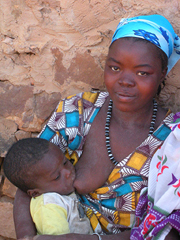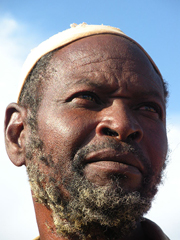
Photo: Habibou Bangré/IRIN
|
Men in Mali's Dogon country, including a village chief, are taking on a greater role in promoting exclusive breastfeeding and other practices for better child nutrition |
BORO, 8 June 2010 (IRIN) - Men in Mali’s Dogon country are beginning to play a greater role in ensuring children eat properly – a shift nutrition experts say is important to tackling child under-nutrition, which is chronic across Mali and the entire Sahel region.
“More and more men are realizing the importance of nutrition,” said Ali Guindo, who works with the local NGO Yam Giribolo Tumo (Association for the promotion of women in the Dogon language). The NGO says changes are thanks in part to extensive awareness campaigns, but also for purely economic reasons.
“Men are beginning to understand that the matter of nutrition is not just for women but for the entire family,” said Yaiguere Tembely, Yam Giribolo Tumo coordinator.
Fathers see the savings in prevention, she said. “Many tell us it is better to fight malnutrition because a malnourished child falls ill more often and treatment and medicines are expensive.”
Nutrition experts say men, traditionally the wage earners and heads of household in Mali, can use their influence to support children’s health and nutrition.
“It is important that men get involved in the family’s nutrition as it is they who take decisions in the household,” Hadja Raki Ba Samaké, head of nutrition at Mali’s Health Ministry, told IRIN.
Men in Boro village, some 700km northeast of the capital Bamako, are increasingly making sure that food purchases answer children’s nutritional needs, local aid workers told IRIN.
“Fathers are buying fortified flour when necessary… and each day they make sure fish, meat, eggs or fruit are added to the family meal,” Guindo said.
Samaké added: “When families live off livestock or gardening, the man must accept that not all is sold off – that part of it be kept to provide nutritious and varied complements to the millet-based meal most families eat.”

Photo: Habibou Bangré/IRIN |
A community volunteer health worker in Biné, Mali Dogon country |
Local traditional leaders are also assuming a greater role. Boro’s village chief intervenes when women throw out colostrum – early mother’s milk packed with nutrients and antibodies but thought by many women to be toxic – or give water to their newborns. He calls a meeting to remind women of the importance of exclusive breastfeeding, according to Tembely.
In Mali, 38 percent of under-five children suffer chronic malnutrition, according to UN Children's Fund (UNICEF), and 15.2 percent suffer acute malnutrition – above the World Health Organization’s emergency threshold of 10 percent.
Family planning
“Education and awareness campaigns have been effective,” Tembely told IRIN. “Still there are those men who refuse to have a role in the family’s nutrition, saying that since their ancestors’ time, feeding the family is the women’s role. In such cases, we cannot force things.”
Moumini, a community health volunteer in his village of Binè, 36km from Boro, agreed that force did not work; instead, he repeats the health messages – especially to men – about the benefits of tending to children’s health and nutrition, as well as focusing on family planning.
“When women get pregnant shortly after giving birth, they abruptly cut the baby off breast milk… I tell men constantly to leave adequate time between children. For those who don’t agree, I just keep telling them again and again. Every single day if need be.”
* This article was amended on 9 June |


